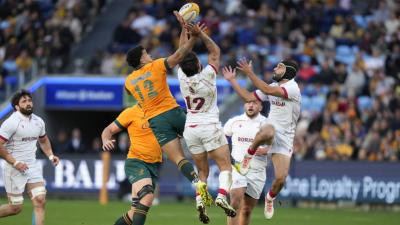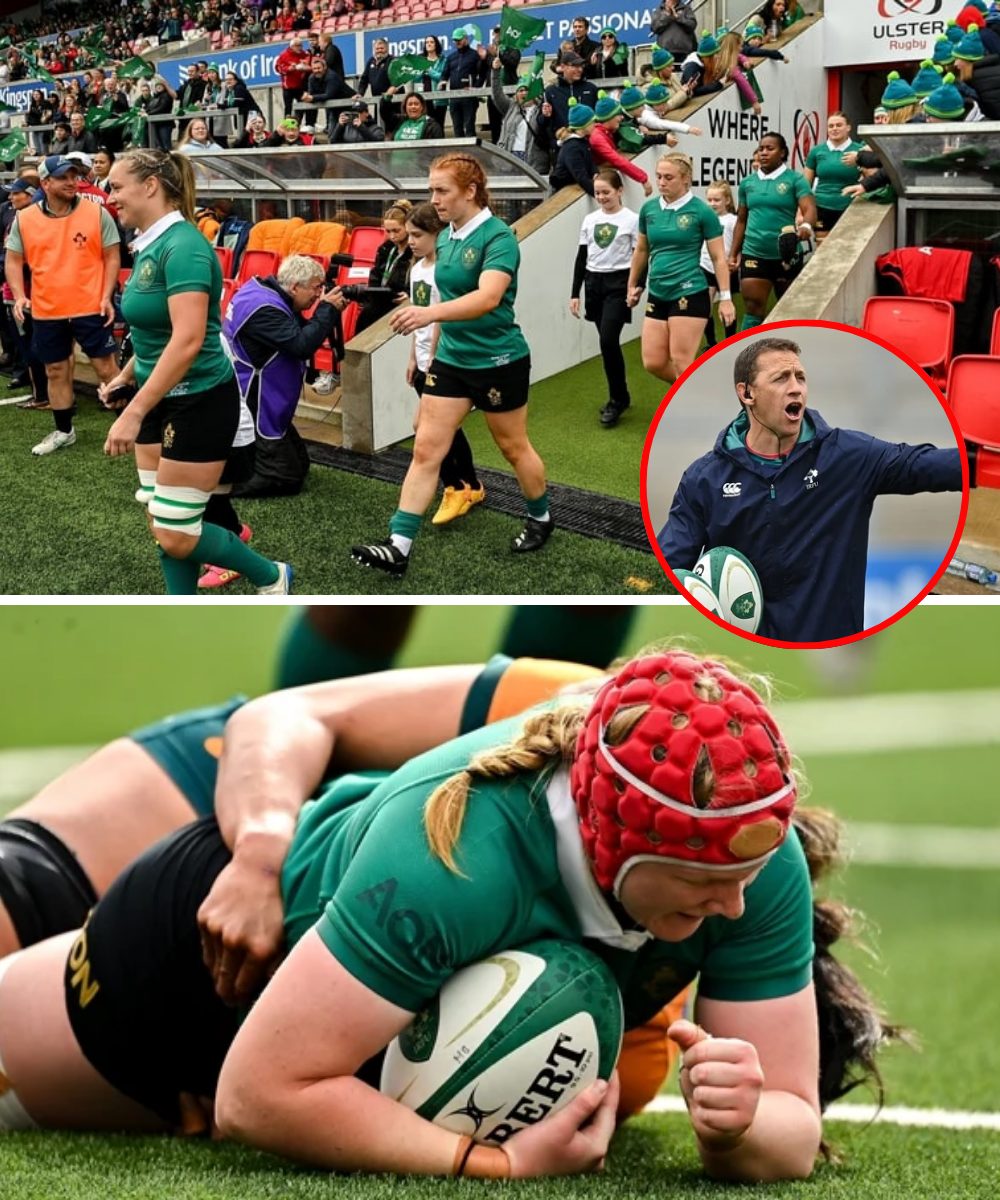That’s the beauty of having low expectations. A last-minute 20-19 Wallabies win over Argentina may once have been met with shrugged shoulders and a ‘let’s hope we win by more, next week’ kind of vibe.
But right now, this win feels like genuine cause for celebration and an important stepping stone for Joe Schmidt, as he slowly pulls together a Wallabies squad that he believes he can mould into a top-tier side.
Let’s be clear; winning in Argentina is never easy. The environment is loud, intimidating and uncomfortable; the stadia unlike anything the players are used to at home.
Then there’s the quality of the opposition. The Pumas might still be too inconsistent for their own good, but they are studded with high-class professional players and are rightfully ranked above nations like Australia, Scotland and Wales.
There were also the conditions to deal with. Same for both sides to be sure, but after a difficult time in the wet in Perth, frequent squalls of sideways rain weren’t really what the Wallabies were looking for here, to help progress their rebuild.

As it happened, the handling from both sides was better than the conditions suggested, and the match developed into an intriguing, cut and thrust battle, with the Wallabies a head-bob in front at the wire.
Yes there were flaws and the customary, frustrating lapses of concentration and s𝓀𝒾𝓁𝓁 errors. Rather than bother with kick-off receipt, the Wallabies might have been better to try crossing their fingers and seeing if they could will the ball to bounce out, so as to restart with a line-out.
But the bad was far outweighed by the good. Three things stood out; firstly, individual players not drifting in and out of the game, but putting in sustained efforts throughout the period they were on. The data around the number of positive involvements in both defence and attack makes for pleasant reading.
Having Angus Bell back and fit is a blessing. Carlo Tizzano took full advantage of a type of game that suited his terrier style, but really, the whole forward pack worked hard and kept working hard.
Secondly, despite coming under pressure from the Pumas’ line speed, there was far more cohesion between backs and forwards than there’d been against South Africa. Gaps were hard to find, particularly early on, and for the most part the Wallabies kept their shape and this felt like a team performance, not a bunch of earnest but wayward individuals trying their luck.
The return of Jake Gordon at halfback was central to this; an effective link man, then on hand to support the excellent Tom Wright at the crucial moment.
The latest man onto the captaincy carousel, Harry Wilson, will be pinching himself. A 100 per cent record as skipper was just reward for a busy match on the carry, and his jolting, try-saving tackle on Thomas Gallo, after Nick Frost had inexplicably shown the Pumas prop a fast lane to the try-line.
A third takeaway for the Wallabies was their end-game composure. Noah Lolesio had endured a poor ten or so minutes at the back, but it was his scything breakout that gave the Wallabies the field position to mount their final attack.

The final line-out was safely secured, and the phase play that took them to the shadow of the goalposts was dynamic and clinical. More on World Rugby’s ‘Mickey Mouse’ shot clock later, but Ben Donaldson was always in calm control of the situation to close out the win.
And so, back to those expectations. An away win has been secured when most fans will have been expecting a run of four more losses. Argentina will be better next week – they never really got their running game going and it is their turn to respond to a loss – but the self-belief gained here by the Wallabies is hugely valuable.
A loss next week and a shared series 1-1 will now look different for the Wallabies – and far more disappointing – than it would have looked a week ago. That raising of expectations is of course is a good thing; it is time for this side to start setting new performance benchmarks, and to begin meeting and exceeding them.
Also coming from behind were the Springboks at Ellis Park, scoring twice in the last 13 minutes to overcome a plucky but ultimately underpowered All Blacks, 31-27.
This fixture never fails to deliver, and once again, this was a classic case of the old rivals going hammer and tongs to the death, albeit with the home side batting a bit deeper off the bench.
There were familiar scenes early; TJ Perenara ambushed by referee Andrew Brace sweating on him to open his mouth, and the Springboks’ 16th man, Renee Naylor, once again stepping on to the pitch in a non-injury break to involve herself in the game.
The All Blacks will be happy enough with their four tries; the brace to Caleb Clark delightfully constructed and executed. But because they couldn’t lock step with Brace, conceding 14 penalties to five, they were never able to sustain ideal field position in the second half.

There was a clear difference between the sides at the attacking breakdown, with the All Blacks sometimes too clumsy (on one occasion both cleaners fell over at the same time), too inaccurate, or too slow to support isolated runners, and unable to exert the same pressure on the Boks.
With the few opportunities the All Blacks got to extend their 27-17 lead, they lacked confidence and power, as if they had retreated into a shell; no better exemplified when a bonus line-out win and front-foot ball in the 59th minute was meekly shovelled through hands and converted into a territory loss.
Entering the final quarter, with the Boks winning the kicking game, the sin-binning of Ofa Tu’ungafasi set up the inevitable power finish; Kwagga Smith and Grant Williams finishing off muscular prep work in the narrow channels.
When a match changes course in the final quarter it’s natural to look closely at impact from the respective benches. For South Africa, coach Rassie Erasmus went early, his whole bench empty by the 50th minute, whereas Scott Robertson didn’t even make his first change until the 55th minute.
There’s something to be said for allowing players time to find the pace of the game. In that respect the difference was that South Africa was playing to a 23-man plan, whereas the All Blacks seemed more reactive and throwing darts in their vain search for a late spark.
Whatever, the Boks maintained their team cohesion throughout, while the All Blacks gradually became more of a team of individuals, desperately trying to hang on. Given where the two sides are in their development, that’s not altogether unsurprising.
For 60 minutes at least, this was the best All Blacks’ performance under Robertson, so there is plenty to take forward. And given the circumstances surrounding Bongi Mbonambi’s first-half ‘try’, they can be excused for feeling a little hard done by.

Yes, this match contained plenty of ‘what about this?’ and ‘what about that?’ moments for both sides. But arguing the toss over subjective, run of play calls or maul set-ups are not the same as overt scoring actions in a game decided by less than a score.
The rugby world has suffered over two decades of TMOs injecting themselves into matches, frequently to the game’s detriment, not benefit.
In the last meeting between these two sides, the World Cup Final, a TMO introduced himself, knowingly outside of what the regulations provided for, to overturn an All Blacks’ try.
This time around, TMO Brian MacNeice was nowhere to be found. For New Zealand fans, ten months ago crying out for less TMO involvement, this was a cruel case of ‘be careful what you wish for’.
Also a hot mess – as predicted by this column a few weeks ago – is World Rugby’s shot clock. In Johannesburg, Sacha Feinberg-Mngomezulu was timed out by Brace for not getting a conversion attempt away in time. Yet minutes earlier, Damian McKenzie’s conversion of Codie Taylor’s opening try was allowed to stand, despite vision showing the shot clock had expired.
In La Plata, referee James Doleman had to explain to agitated Wallabies that the shot clock they were working off was “wrong” before allowing Santiago Carreras a re-kick.
And what about the chaos at the end of the match, where because of a lack of clarity around the process, Argentina could feel they were denied a final opportunity to win the game? Doleman could clearly be heard telling the Pumas that there would be a restart, before welching on his word.

As ever when it comes to rugby administration, the shot clock concept has been hastily introduced, only half thought through. The allowed 60 seconds begins when the referee signals that the attacking side has elected to shoot for goal. But what about the time that elapses between the penalty being awarded, and that signal?
In this case, Doleman awarded the penalty at 78:46. It took until 79:12 before the kick signal was made and the shot clock started. That’s 26 seconds of crucial match time lost in the ether. Donaldson thus knew he had a differential, and calmly timed things to suit.
Does this mean we now need a ‘decision clock’, as well as a shot clock? Imagine a captain hiding from the referee’s sight, or perhaps down with a trainer, or players engaging the referee in discussion to distract him, while time ticks away.
This situation badly needs an injection of common sense, consistency and transparency. An obvious solution is to mandate that in all instances where a try or penalty is awarded before the end of the 79th minute, a restart will take place, irrespective of what happens with the shot clock.
According to World Rugby’s own data, the sport generates $12.4 billion in value globally. Rugby has been professional – at least in name – since 1995. It shouldn’t be too much to ask for the game’s administrators to ensure that timekeeping systems are devised, maintained and implemented professionally.





